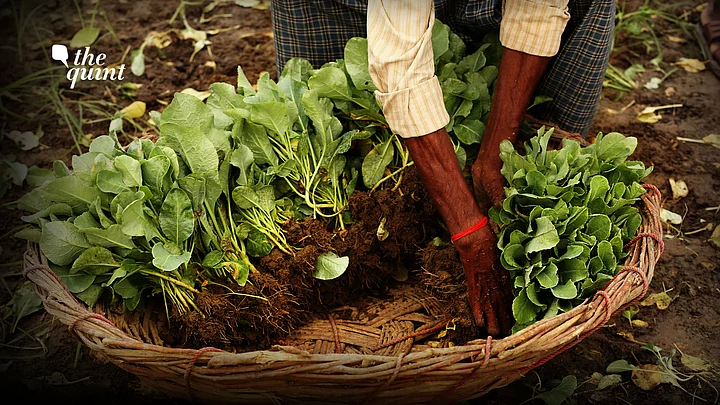The outbreak of the coronavirus disease in December 2019 and its consequent spread across the globe has pushed the entire world into a serious crisis, bringing even the so-called super-powers to their knees. The subsequent lockdowns in the affected nations led to a stoppage in the exchange of agricultural products. This caused an unprecedented disruption in the supply chain from rural areas to urban centres, thereby deeply affecting the daily requirements of urban populations. Thus, this situation has revealed one highly significant but neglected aspect of our economic setup: the absence of urban farming and the resultant near-total dependence of urban communities on the supplies from the countryside.
That Time Shah Jahan Lost His Cool Over... Mangoes!
Urban agriculture or urban farming is the practice of cultivating, processing, and distributing food in and around urban areas. It involves small-scale agricultural operations, animal husbandry, aquaculture, agroforestry, urban bee-keeping, and horticulture. The idea of supplementing food production beyond rural farming is not new. In the Indian subcontinent, it dates back to c.7000 BCE, Mehrgarh, when the earliest farming communities practiced farming on the edges of the Indus plains. They produced grains and domesticated cattle. The remarkable progress in technology gradually helped polish the art of farming.
In fact, successful farming is what gave rise to the first cities in human history.
During Mughal times, sufficient evidence points towards the practice of urban farming. About Emperor Akbar it is said that he ensured that his vegetable plants were carefully nourished with rosewater so that the resultant cuisine would smell fragrant.
Shah Jahan’s fondness for mangoes was so deep that he had his own son, Aurangzeb, punished and placed under house arrest because the latter kept all the mangoes in the palace for himself!
Why US’s ‘Victory Gardens’ & Michelle Obama’s ‘Kitchen Garden’ Are Important
As human civilisation progressed, the production of food was confined to rural communities, while the urban populace largely engaged itself in trading activities and non-farming activities. Urban farming turned into a mere hobby, thanks to the advent of a modern chain of transport and communication that globalised the exchange of food stuffs. However, there were times when urban people had to give in.
Natural disasters such as famines, floods, plagues, etc, and the acts of man, such as war, encouraged urban population to explore farming due to the disruption in global supply chains of food varieties coming from farming communities. This particularly happened in the West. During World War I, American President W Wilson and First Lady Edith Wilson, used sheep to mow and fertilise lawns to save resources for war effort. Likewise, they called upon all the citizens to utilise open spaces for food growth to reduce pressure on rural food production. In a similar fashion, during World War II, UK, Canada, and the US planted ‘victory gardens’.
The victory gardens in America contributed an estimated 40 percent to the vegetable supply in the country.
In the recent times, former US First Lady Michelle Obama furthered the concept of ‘kitchen garden’. This garden, located in the premises of the White House, has a beehive, and also grows nearly 55 varieties of vegetables and fruits. Singapore encourages the innovative urban farming approach such as ‘rooftop farming’ to enhance greenery and improve food supply resilience.
Such movements are largely meant to awaken urban people to the benefits of urban farming and to encourage them to cultivate healthy foods in their confined spaces.
When put into practice, it can help in the transformation of cities from ‘consumers-only’ to generators of agricultural products which may contribute to economic sustainability.
Urban Agriculture Can Help Solve Hunger & Malnutrition
While stimulating the economy at the local level, urban farming could thus, ensure food security. Additionally, by localising produce, urban farming can cut down the significant amount of carbon emission by saving fuel which is otherwise used for the packaging of food items and their transportation to cities. The population boom around the world has largely contributed to widespread hunger, malnutrition and a variety of other health issues. Urban agriculture has the potential to correct this by producing sufficient fresh food which can ultimately reduce the graph of poverty elevation and health issues by improving the quantity and quality of food.
Of course, there are a lot of challenges in urban farming but, then, when have humans achieved anything without overcoming challenges? Technology, creativity, and innovation have proven essential to navigating logistics.
Modern planning and design initiatives will act as models for urban farming, which will ultimately contribute in the current scope of sustainable design.
Thus, it is high time the urban communities take cognisance of this potential and, rather than being solely consumers, try producing essential food commodities in their own limited spaces. By doing so, they can save themselves and the rest of humanity in such times of crisis in the future.
(The author is a researcher with the Centre of Advanced Study, Department of History, Aligarh Muslim University. He can be reached at basharatparray77@gmail.com. This is an opinion piece and the views expressed are the author’s own. The Quint neither endorses nor is responsible for them.)
